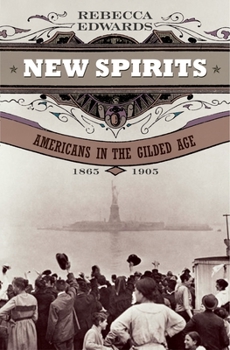New Spirits: Americans in the Gilded Age, 1865-1905
Select Format
Select Condition 
Book Overview
New Spirits: Americans in the Gilded Age, 1865-1905 provides a fascinating look at one of the most crucial chapters in U.S. history. Rejecting the stereotype of a "Gilded Age" dominated by "robber barons," author Rebecca Edwards invites us to look more closely at the period when the United States became a modern industrial nation and asserted its place as a leader on the world stage. Employing a concise, engaging narrative, Edwards recounts the contradictions...
Format:Paperback
Language:English
ISBN:0195147294
ISBN13:9780195147292
Release Date:December 2005
Publisher:Oxford University Press, USA
Length:304 Pages
Weight:1.00 lbs.
Dimensions:0.6" x 9.1" x 6.0"
Customer Reviews
5 ratings
Takes you back to a different world.
Published by Thriftbooks.com User , 14 years ago
After reading this book - it shows that things in this country really haven't changed and history repeats itself. Written so well, it makes you feel you're in a time machine going back in history of this country. Excellent read for history buffs who want to know what it was like to live during the late 1800's right after the civil war and right at the turn of the last century.
Complementary readings to Edwards' interesting book
Published by Thriftbooks.com User , 16 years ago
There are already several good reviews on this book, so I will only suggest reading the following books on the USA in addition to Edwards': A) Dealing with constitutional and political ideas: 1) Constitutional History of the American Revolution by John Phillip Reid; 2) "America's Constitution: A Biography" by Akhil Reed Amar; 3) "Liberty's Blueprint: How Madison and Hamilton Wrote The Federalist, Defined the Constitution, and Made Democracy Safe for the World" by Michael Meyerson; and 4) Lincoln's Constitution by Daniel A. Farber. B) Other books chosen with an approach historically impressionistic: 5) "The Death Penalty", by Stuart Banner; 6) "The Churching Of America, 1776-2005: Winners And Losers In Our Religious Economy" by Roger Finke and Rodney Stark; 7) "American Colonies. The settling of North America", by Alan Taylor; and 8) "Battle cry of freedom. The Civil War Era" by James M. McPherson.
Back to the Future: The Gilded Age Returns?
Published by Thriftbooks.com User , 18 years ago
Edward's book is a very nice total history of the time period, with particularly interesting examinations of the culture. Edwards effectively tears down the notion of a sudden birth of a Progressive Era and looks at its roots in the "Gilded Age." She, in a very thoughtful way, breaks down some of the simple victomology that tends to encompass study of the period and instead examines the more complex interrelations of class, race and gender in this formative period in US History. She implicitly argues that much of the late nineteenth century is very akin (i.e. recognizable) to the late 20th with its pro-big business and aggressive and racist foreign policy. The book is simply smashing.
Forgotten age
Published by Thriftbooks.com User , 18 years ago
Dr. Edwards newest book is a smash for history buffs. The book attacks the Gilded age with a fresh thematic style that avoids the stuffy typical academic style. She does a great job covering the social issues and doesn't get bogged down in the militarism of the period either. She does a super job exposing the racism and crushing ambivalence of unrestrained capitalism of the age and still has room for a chapter on the sexual mores of the era. There was one draw back though, in avoiding the academic style she decided not to use footnotes which hampers us graduate students from following in her foot prints. For example what student would fail to be motivated to read a first hand source that contains this information, "and one infamous book instructed married couples to schedule sexual intercourse once every three years, between the hours of 11 A.M. and noon. The author even made recommendations on what to eat that day for breakfast" Now how will a dutiful student ever know what that fortifying morning repast should consist of without a footnote to the primary source? I liked how Dr. Edwards ended her book. Edwards ends her work with an epilogue that ties the whole book back to her philosophical guide, Walt Whitman, in the guise of a guided tour of the 1904 St. Louis World's Fair. She mixes the optimism characteristic of Americans with the depredations characteristic of unchecked capitalists. She ends on a haunting note that actually stirs the heart of a historian to wonder what comes next. And so we grad students move out to discover that answer...
A Lover of the Gilded Age
Published by Thriftbooks.com User , 18 years ago
Dr. Edwards's new book is superior in all respects. Her account is interesting, lucid, and fun. I learned many new things about this critical period in our history from her fine narriative that relies on recent scholarship. Nothing dusty or drab here at all. As a history teacher, I highly recommend her book to professionals, teachers, and students. This is a winner and should not be passed up. We must hope that she continues to research and to write on this period.






